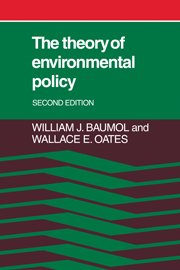Book contents
- Frontmatter
- Contents
- Preface to the second edition
- Preface to the first edition
- 1 Introduction: economics and environmental policy
- PART I On the theory of externalities
- PART II On the design of environmental policy
- 10 Introduction to Part II
- 11 Efficiency without optimality: the charges and standards approach
- 12 Marketable emission permits for protection of the environment
- 13 Stochastic influences, direct controls, and taxes
- 14 Taxes versus subsidies: a partial analysis
- 15 Environmental protection and the distribution of income
- 16 International environmental issues
- 17 National or local standards for environmental quality?
- Index
14 - Taxes versus subsidies: a partial analysis
Published online by Cambridge University Press: 05 June 2012
- Frontmatter
- Contents
- Preface to the second edition
- Preface to the first edition
- 1 Introduction: economics and environmental policy
- PART I On the theory of externalities
- PART II On the design of environmental policy
- 10 Introduction to Part II
- 11 Efficiency without optimality: the charges and standards approach
- 12 Marketable emission permits for protection of the environment
- 13 Stochastic influences, direct controls, and taxes
- 14 Taxes versus subsidies: a partial analysis
- 15 Environmental protection and the distribution of income
- 16 International environmental issues
- 17 National or local standards for environmental quality?
- Index
Summary
We can rest assured that firms and municipalities that are asked to reduce their damage to the environment will look to state and federal agencies for financial assistance. Such a request may seem uncomfortably analogous to the case of a holdup man who appeals to his victims to finance the costs of his going straight. Sometimes, however, a persuasive case can be made in terms of equity. What of the firm that built its smoking factories well away from the centers of population only to find itself surrounded by inhabitants a few decades later? Is it really the company that is responsible for the damage generated by its emissions of smoke?
We must admit to feeling that too much has probably been made of such cases in the literature, and that there usually is some presumption against rewarding government agencies and private enterprises for the damage they have done to the environment in the past. But whatever the virtues of the matter, the issue is a real one. There will continue to be calls for subvention of industrial activities that may otherwise find themselves at a competitive disadvantage and of local agencies whose budgets are already under heavy strain.
The central question here is whether or not it is possible to attain an optimal pattern of resource use through a program of subsidies rather than fees. In Chapter 4, we showed that there is a set of Pigouvian taxes that will sustain optimal levels of externality-generating activities in a competitive system.
- Type
- Chapter
- Information
- The Theory of Environmental Policy , pp. 211 - 234Publisher: Cambridge University PressPrint publication year: 1988
- 2
- Cited by



